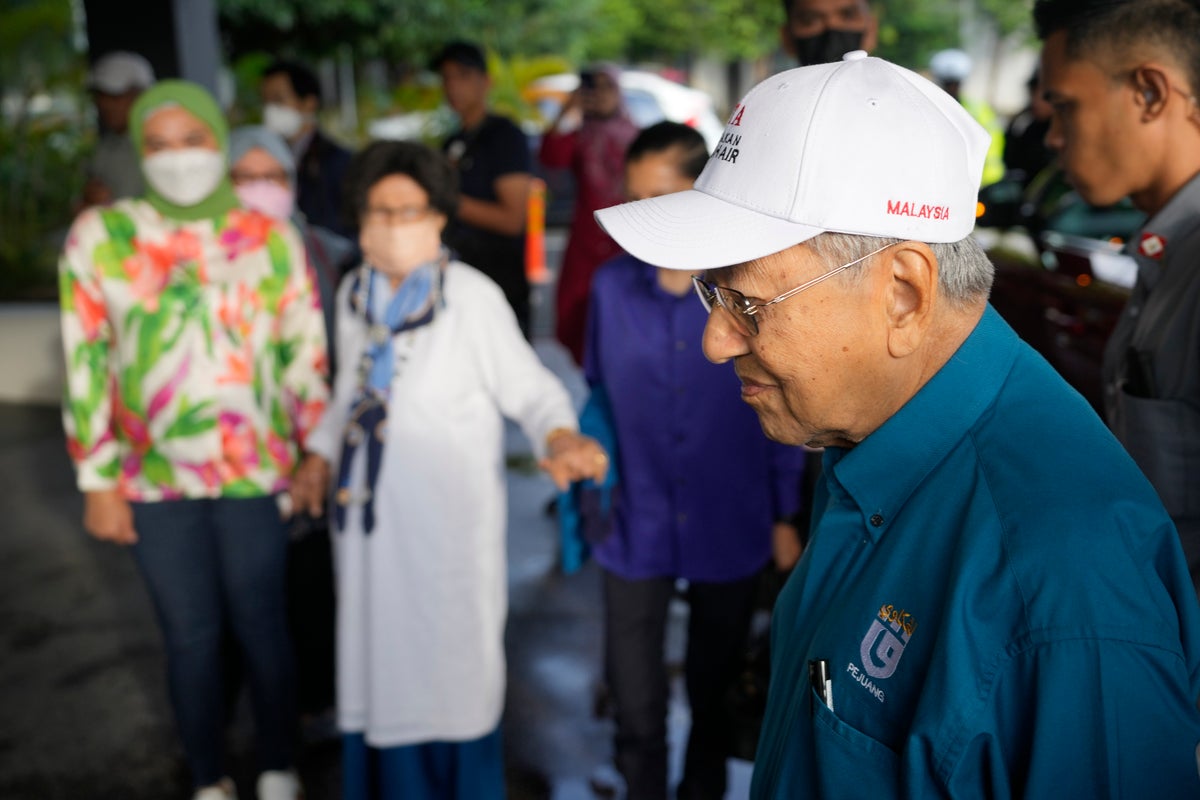
Campaigning for Malaysia’s general elections formally started Saturday, in a highly competitive race that will see the world’s longest-serving coalition seeking to regain its dominance four years after a shocking electoral loss.
The Nov. 19 election will determine if Barisan Nasional (BN), or National Front coalition, can make a strong comeback or whether political reformers can secure another surprise win that will see their leader, Anwar Ibrahim, achieve a long-held dream of becoming prime minister.
Led by the United Malays National Organization, BN has ruled since Malaysia’s independence from Britain in 1957. But anger over government corruption led to its defeat in 2018 polls to Anwar’s Pakatan Harapan (PH), or Alliance of Hope. The election victory sparked hopes of reforms as once-powerful UMNO leaders were jailed or hauled to court for graft, but it was short lived after defections caused the PH government to crumble in early 2020 and brought UMNO back to power.
Scores of candidates, including Anwar and 97-year-old, two-time former Prime Minister Mahathir Mohamad, submitted their nomination papers at their constituencies Saturday, paving the way for the start of a 14-day campaigning period.
More than 21 million Malaysians will cast ballots to fill 222 seats in federal Parliament and choose representatives for three state legislatures.
“The general consensus is that the old ruling party Barisan Nasional will do very well and it is very likely that the only other coalition that can challenge BN is Pakatan Harapan,” said James Chin, an Asian expert at Australia’s University of Tasmania.
Prime Minister Ismail Sabri Yaakob, from UMNO, registered to defend his seat in central Pahang state. Anwar, escorted by drummers and supporters waving party flags, filed his nomination in Tambun in central Pekan state — a new seat for him where he will face off with the incumbent, who had defected from his alliance.
Anwar didn’t participate in the 2018 vote because he was in prison for a sodomy conviction he said was politically motivated. The PH campaign was led at the time by Mahathir, who became the world’s oldest leader at 92 after its victory. Anwar was pardoned shortly afterward and was to take over the baton from Mahathir. But distrust and infighting led to the PH government’s collapse, sparking political turmoil that has continued under the new governments that took power.
Malaysia has had three prime ministers since the 2018 polls. Ismail dissolved Parliament on Oct. 10, nine months ahead of schedule, at the behest of UMNO leaders for early polls despite a risk of floods due to monsoon rains. Spurred by several state victories, UMNO believes it has the upper hand over a fragmented opposition and before an economic slowdown expected next year.
Analysts said the emergence of two new Malay-based political alliances in peninsular Malaysia could split votes among ethnic Malays, who form two-thirds of Malaysia’s 33 million people.
The Perikatan Nasional (PN), or National Alliance, is led by Muhyiddin Yassin. His Bersatu party was a part of Anwar’s group in 2018 polls but defected to form a new shaky government with UMNO that was riven with rivalry.
Mahathir, once Asia’s longest-serving leader for 22 years until 2003 before his brief 2018 stint, also formed a motley alliance to contest 121 parliamentary seats. Despite his fading popularity, he is defending his seat in the northern resort island of Langkawi as he again vowed to oust a corrupt UMNO.
In two states on Borneo island that jointly account for a quarter of parliamentary seats, a slew of other parties are battling it out. The ruling state governments are traditionally aligned with BN.
“In 2018, it was a long-serving BN government against a long-serving opposition but now, it is not so clear. People have more choices,” Chin said. Some analysts cited possibilities of a hung parliament with no single coalition able to gain a majority that could see new alliances formed post-election.
Analysts said the addition of 6 million new voters due to a lower voting age also adds to the uncertainty, while voter turnout could be impacted by bad weather. Parts of Malaysia have already been affected by floods. Malaysia’s meteorological department warned that severe monsoon rains would start next week that will cause flash floods in low-lying areas and by the river and seaside.







